4 Latin America and the Caribbean
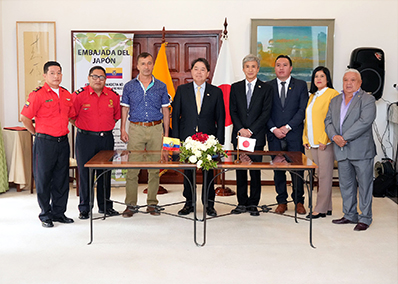
The signing ceremony for six Grant Assistance for Grass-Roots Human Security Projects totaling 58 million yen, attended by Foreign Minister Hayashi at the residence of the Ambassador of Japan to Ecuador (January 2023)
Latin America and the Caribbean, comprising 33 countries, is a major force in the international arena and has an enormous emerging market with a population of approximately 650 million Note 15 and a regional GDP of approximately 5.5 trillion US dollars Note 16 (as of 2021). This region is of strategic importance in terms of diplomacy and economy. Since many of its countries respect fundamental values such as freedom, democracy, and the rule of law, and are also suppliers of minerals, energy, and food, Latin America and the Caribbean has steadily enhanced its presence in the international community. Especially in the current circumstances, when food and energy supplies are seriously affected globally, the role of Latin America and the Caribbean is becoming increasingly important.
On the other hand, the Latin American and the Caribbean region still has major developmental needs to be addressed within common challenges facing the international community, including climate change, disaster risk reduction, vulnerabilities in the areas of health and medical care, which were revealed by the spread of COVID-19, and poverty. There are also many countries in this region having vulnerabilities particular to small island states.
This region has a traditionally strong personal and historical bond with Japan due to the Nikkei (Japanese immigrants and their descendants) communities, which has a population of approximately 2.3 million, the largest among all Nikkei communities in the world. Japan has thus maintained stable and friendly relations with this region for a long period. Japan focuses on maintaining and strengthening these relations with the Latin American and the Caribbean region by providing assistance unique to Japan (such as quality infrastructure, disaster prevention and mitigation utilizing Japan’s experiences, clean energy technology, “Visible Japanese Development Cooperation” through technical cooperation by volunteers and others) in ways that consider each country’s income level, situations, and needs. Through such assistance, Japan strives to help the region realize resilient and sustainable development.
● Japan’s Efforts
In 2022, Foreign Minister Hayashi affirmed through foreign ministers’ meetings with countries in the Latin American and the Caribbean region that Japan will further deepen its cooperation with each of the countries on global issues, including economic security and environmental issues. In January 2023, Foreign Minister Hayashi visited Mexico, Ecuador, Brazil, and Argentina, and reaffirmed that Japan will work to strengthen bilateral economic relations, cooperation, and exchanges with them. He also reaffirmed that, in view of the current severe situation facing the international community, Japan will work more closely with these countries in maintaining and strengthening a free and open international order based on the rule of law, as well as addressing important global issues such as climate change. State Ministers for Foreign Affairs and Parliamentary Vice-Ministers for Foreign Affairs of Japan who also visited Latin American and the Caribbean countries in 2022 expressed Japan’s intention to support the growth of these countries through supporting the restoration of the region’s economic and social stability affected by the spread of COVID-19, continuously cooperating in the areas of health and medical care, helping enhance the region’s resiliency, and promoting digital transformation (DX) and green transformation (GX). Through these efforts, Japan strives to further strengthen its ties with the Latin American and the Caribbean region.
■ Efforts toward Disaster Risk Reduction and Environmental Issues
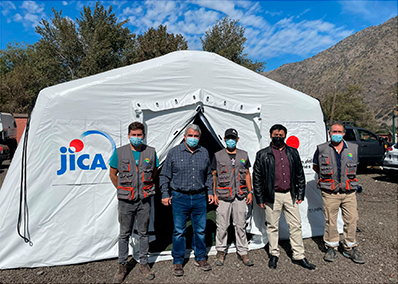
An evacuation tent which Japan provided to Chile under the “Project for Strengthen Contagion Prevention Measures in Emergencies under COVID-19,” a technical cooperation project (Photo: JICA)
While the Latin American and the Caribbean region is blessed with abundant nature, the region is prone to natural disasters such as earthquakes, tsunamis, hurricanes, and volcanic eruptions. Therefore, it is of great importance that Japan supports this region with its knowledge and experience in the field of disaster risk reduction.
In 2022, Japan extended grant aid to Haiti through the United Nations Development Programme (UNDP) , which was devastated by the 7.2 magnitude earthquake in 2021, for the reconstruction of hospitals and police stations in the affected areas. Japan provides assistance that utilizes its expertise in the disaster risk reduction to the Latin American and the Caribbean countries facing the Pacific Ocean including Ecuador, Mexico, and Peru, where earthquakes frequently strike. Japan also provided emergency relief goods to Belize, Brazil, Cuba, Guatemala, and Honduras, which suffered damages from hurricanes, flooding, and other disasters in 2022. For Caribbean countries, Japan provides various kinds of assistance to help them overcome the particular vulnerability of island states to natural disasters and climate change. For example, Japan extended grant aid to Surinam in October 2022 for the provision of disaster risk reduction equipment made by Japanese companies, including drainage pumps, to be used for flood disaster prevention.
Moreover, Japan provides wide range of cooperation as the efforts to address environmental issues in the region, including assistance for scientific and technological research on climate phenomena, conservation of biodiversity, and conservation of the Amazon rainforest using remote sensing. In March 2022, Japan extended a loan to Peru for the construction of solid waste management facilities. In the areas of promoting energy conservation and reducing greenhouse gas emissions, Japan also provides support for the introduction of solar power generation in countries such as Mexico and Brazil through Private-Sector Investment Finance and other schemes. In 2021, Japan provided yen loans to the Dominican Republic and Paraguay to increase energy efficiency.
■ Economic and Social Infrastructure Development
In order to promote economic and social infrastructure development of the Latin American and the Caribbean region, Japan actively engages in developing water supply and sewerage infrastructure in metropolitan regions and the countryside. In February 2022, Japan extended grant aid to Paraguay for the construction of water supply systems. In addition, Japan works on spreading its terrestrial digital broadcasting system (ISDB-T) Note 17 through public-private collaboration. As of December 2022, 14 countries in Latin America and the Caribbean adopted the Japanese system. For these countries, Japan provides technical transfer and carries out human resources development to achieve smooth introduction of the system.
HondurasPublic nomination
Support Activities by a Japanese NGO to Protect the Lives of Mothers and Children
Project to Improve Maternal Health Care Services in Teupasenti Municipality
Grant Assistance for Japanese NGO Projects (March 2019 – February 2022)
The Municipality of Teupasenti, located in the mountainous area of El Paraiso Department in eastern Honduras, had no facility for childbirth, and thus pregnant women had no choice but to travel outside the city in order to give birth at any facility. There was also an issue of not being able to receive appropriate prenatal care at existing healthcare centers, causing a higher maternal mortality rate than in any other city.
In this project, AMDA Multisectoral and Integrated Development Services (AMDA-MINDS), a Japanese NGO, implemented a wide range of support activities to ensure safe childbirth. It includes the improvement of the existing health centers and their systems, which would serve as the first contact point for community healthcare, as well as awareness-raising activities for pregnant women.
To begin with, AMDA-MINDS provided eight health centers with medical equipment and consumables, including ultrasound diagnostic equipment, with necessary technical training, in order to strengthen the system for health and medical care provision. As a result, prenatal care is now available five days a week at the principal health center with ultrasound equipment installed.
AMDA-MINDS also conducted training for 90 health volunteers and 40 traditional midwives (birth attendants) on emergency medical care, first aid, and perinatal health with the aim of increasing the response capabilities of the community as a whole. The participants recognized their role and acquired knowledge and skills on safe childbirth through the training. This knowledge and information were passed on to a total of 7,750 local residents.
As a result of these activities, the number of pregnant women who received prenatal care four or more times increased from 33% to 74% throughout the city. Furthermore, the number of pregnant women who received ultrasound testing at least once increased from 45% to 80%, while the postnatal checkup rate increased from 65% to 77%. The rate of facility deliveries outside the city also increased from 70% to 80% as residents now have access to accurate health-related information and can spend their perinatal period in a safe environment. These figures indicate that caring systems for expectant and nursing mothers have been established throughout the area. This is indeed a unique NGO project that encourages communities to take voluntary problem-solving efforts while mediating the efficient delivery of government services to local communities.
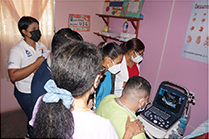
Doctors and nurses participating in a technical training session on how to use ultrasound diagnostic equipment, and examining an image of a pregnant woman’s abdomen on the screen (Photo: AMDA-MINDS)
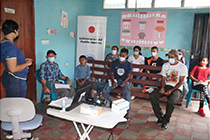
Health volunteers eagerly participating in a training session (Photo: AMDA-MINDS)
■ Initiatives in the Areas of Health and Medical Care, and Education
Japan also provides various kinds of cooperation for Latin American and the Caribbean countries in the areas of health and medical care. In the Latin American and the Caribbean region, due to the underdeveloped medical system, non-communicable diseases, infectious diseases such as HIV/AIDS and tuberculosis, and tropical diseases are still serious public health concerns. Furthermore, the spread of COVID-19 increases the need to establish a system capable of rapid and accurate diagnosis and treatment.
From April 2021 to February 2022, Japan provided grant aid to Belize, Bolivia, Colombia, Cuba, the Dominican Republic, Ecuador, El Salvador, Guatemala, Haiti, Honduras, Jamaica, Nicaragua, Paraguay, and Venezuela, for the development of cold chain systems Note 18 in response to COVID-19. Japan also extended loans to the Dominican Republic, Ecuador, and Honduras to support their response to the COVID-19 crisis in 2021 and 2022.
In response to the rapid spread of cholera, mainly in the capital city since October 2022, in January 2023, Japan decided to provide Haiti with an Emergency Grant Aid of 3 million US dollars in the areas of health, water and sanitation, and food, through the United Nations Children’s Fund (UNICEF), the World Food Programme (WFP), and the International Federation of Red Cross and Red Crescent Societies (IFRC).
Japan also makes continuous effort for the Nikkei communities in various countries in Latin America and the Caribbean, such as providing support for the welfare facilities of the Nikkei communities, accepting trainees, and dispatching Japan Overseas Cooperation Volunteers (JOCVs) (see “Project Introduction Column” for a JOCV’s activities in Belize).
Assistance in the sector of education is extremely important for Latin American and the Caribbean countries, where poverty still persists and education budgets are inadequate. Japan has continuously provided technical cooperation to El Salvador for mathematics and arithmetic education since 2021.
■ South-South Cooperation and Cooperation with Regional Organizations
Argentina, Brazil, Chile, and Mexico achieved results in South-South cooperation, Glossary and Japan signed partnership programs with these countries. Based on such partnerships, Japan collaborated with Argentina in 2022, for example, to provide assistance to small and medium-sized enterprises (SMEs) in Latin America and the Caribbean. In addition, Japan cooperated with Mexico in introducing non-traditional tropical fruit production systems in northern countries of Central America. In Chile, Japan conducts human resources development programs through triangular cooperation Glossary in the field of disaster risk reduction and succeeded in training 5,169 people, exceeding the initial target of 4,000. In Brazil, as a result of many years of cooperation from Japan, the Japanese-style community police system has become widespread. Utilizing this experience and based on the framework of triangular cooperation, Brazilian experts are currently dispatched to Central American countries to pass on know-how in the field of community policing.
Furthermore, Japan cooperates with regional organizations such as the Central American Integration System (SICA) and the Caribbean Community (CARICOM) to provide more effective and efficient support and formulate regional projects related to common development issues in the Latin American and Caribbean region.
■ Assistance for Central American Migrants and Venezuelan Refugees and Migrants
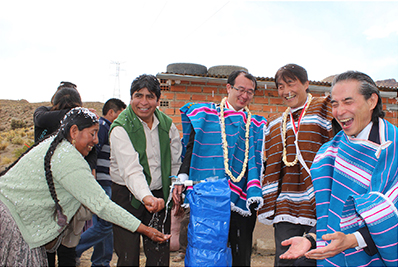
Local residents and staff of the Japanese embassy in Bolivia delighted at the water flowing from a tap at the handover ceremony of the water supply system constructed by Japan’s support
The Central American region faces the problem of migrants who aim to immigrate to the United States and Mexico to flee from poverty and insecurity in their country. Japan provides support for the measures to address the root causes of their migration such as poverty, security, and disasters. Moreover, in cooperation with the International Organization for Migration (IOM) and WFP, Japan provides assistance to El Salvador, Guatemala, Honduras, and Mexico for the promotion of voluntary repatriation of migrants, prevention of outflow of migrants, and social reintegration of returnees.
Due to the deterioration of the economic and social conditions in Venezuela, approximately 7.1 million Venezuelan refugees and migrants have flowed mainly to neighboring countries as of September 2022. This has caused the deterioration in the living conditions of the host community residents and the instability of the region, and the lack of adequate response has been a challenge. In February 2022, Japan announced its decision to provide assistance to Venezuela as well as Colombia and Ecuador, its neighboring countries hosting displaced persons from Venezuela through the Office of the United Nations High Commissioner for Refugees (UNHCR), with the aim of providing social integration support including protection and vocational training for the vulnerable people. In September 2022, in light of the deteriorating humanitarian situation in Venezuela, Japan announced cooperation through UNICEF to improve hygiene conditions in schools and their surrounding areas including installation of hand-washing facilities.
Glossary
- South-South cooperation (Triangular cooperation)
- South-South cooperation refers to cooperation provided by relatively advanced developing countries to other developing countries, utilizing their own development experiences, human resources, skills, funds, and knowledge. In many cases, the cooperation, primarily technical cooperation, is conducted in countries that have similar natural environments, linguistic, cultural, and economic circumstances, and are facing similar development processes. When supported by donors or international organizations, such South-South cooperation between developing countries is referred to as “triangular cooperation.”
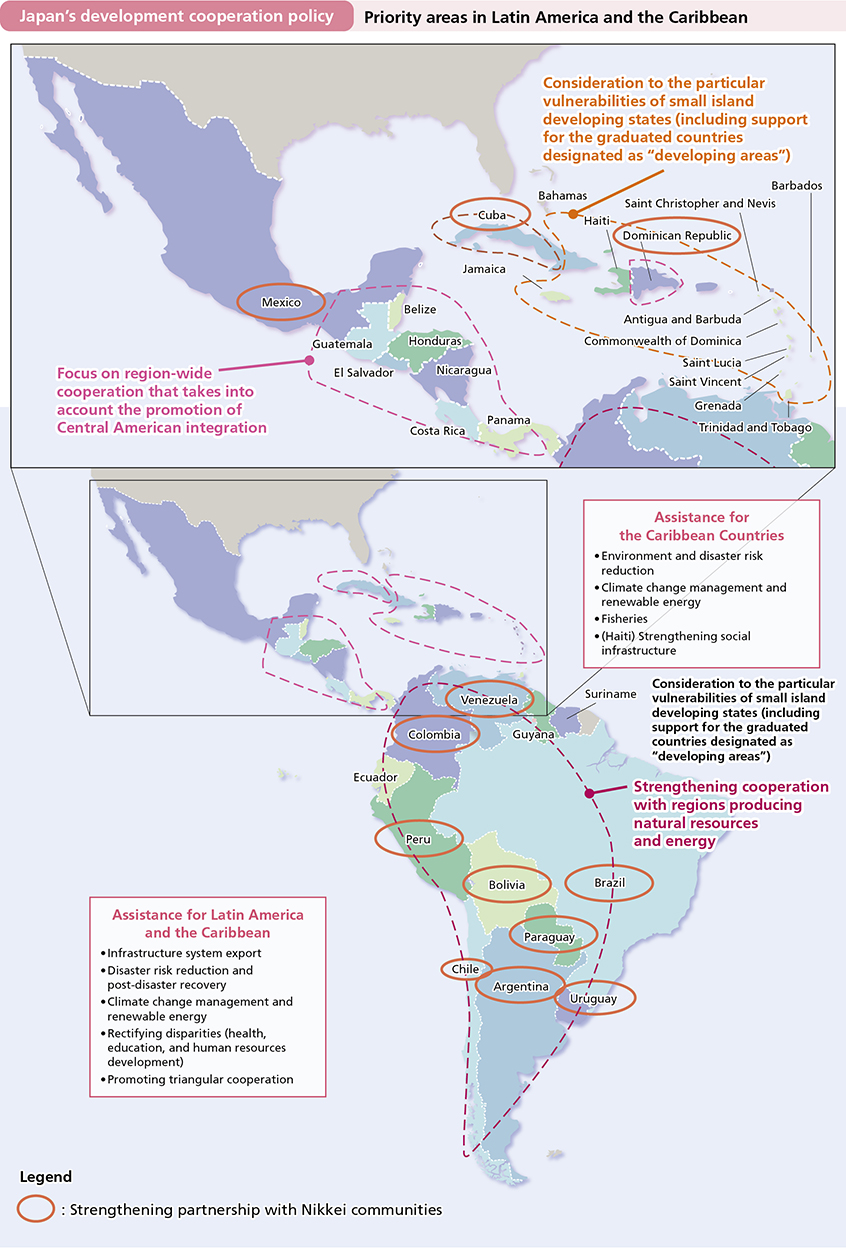
- Note 15: World Bank website https://data.worldbank.org/indicator/SP.POP.TOTL?locations=ZJ
- Note 16: World Bank website https://data.worldbank.org/indicator/NY.GDP.MKTP.CD?locations=ZJ
- Note 17: See Note 20.
- Note 18: See Note 54.
